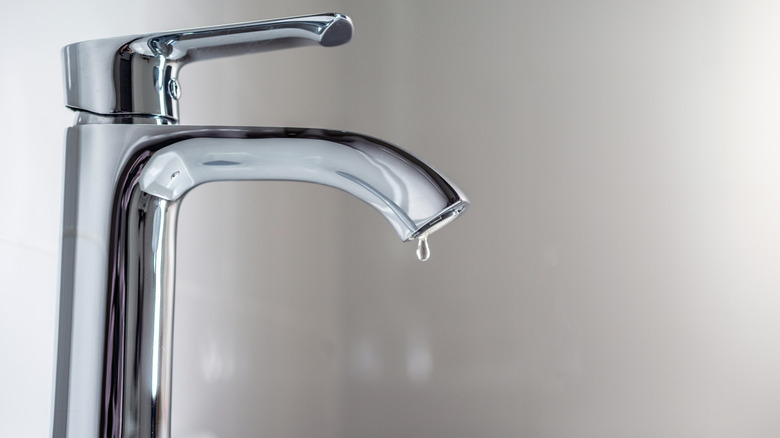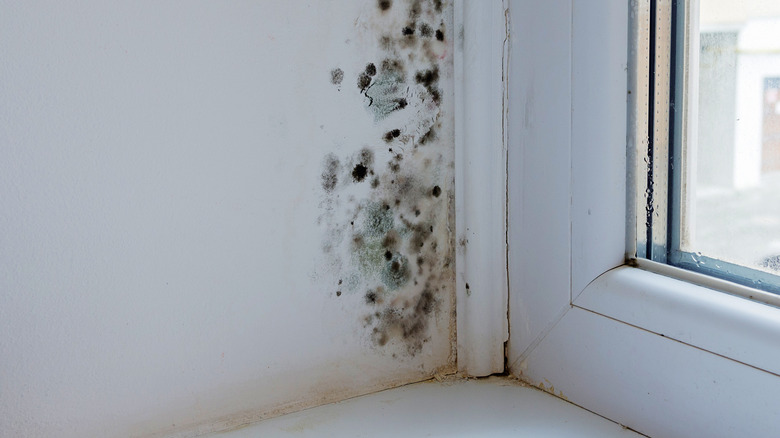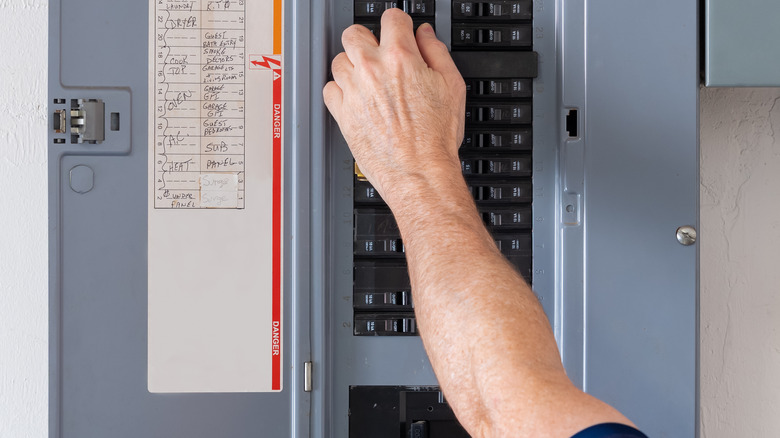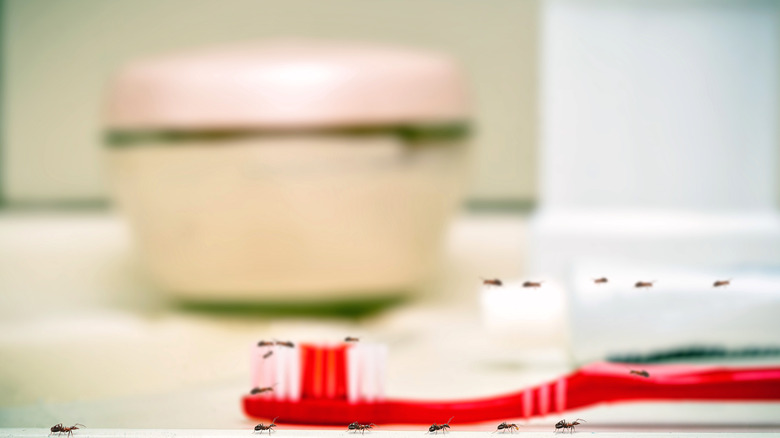A Tiny Water Leak Might Seem Like No Big Deal, But An Expert Disagrees
Perhaps there's an annoying drip from your showerhead that's been an ongoing problem, or maybe there's a spot on the basement ceiling you've been meaning to look into but haven't gotten to it just yet. Clogged lines, excess water pressure, corrosion, broken seals, or even a roof shingle that's come off are all common reasons for water leaks to occur in homes. Sometimes a big leak, such as a burst water pipe or a leaking washing machine requires immediate repair, and you don't hesitate to get it taken care of right away. Yet, for those small problems, it may seem like it's something you could put off.
However, Michael Green, Chief Operating Officer at Benjamin Franklin Plumbing, warns that this is not the case. In an exclusive interview with House Digest, he states "no matter where the leak originates, no homeowner should let this go unattended." Although a small water leak may seem like no big deal, it can actually lead to a whole host of more serious issues.
Leaks can lead to mold and mildew
Mold is very common in homes, so you don't want to do anything to make it easier for it to grow and flourish. "Water damage leads to increased moisture in the air, resulting in mold growth that can potentially impact the health of those living there," warns Green. "Mold and mildew begin to grow after 24 to 48 hours of water exposure, which is why it's important to act fast and not let the leak get worse."
If you fail to deal with small leaks in a timely manner, it could allow for saturation of drywall, carpeting, and other materials. Sometimes those issues are hidden behind the wallpaper or furniture in your home, allowing mold to spread within a short matter of time. Mold spores, tiny, microscopic bits of material, can travel from the area near a leak into the home's HVAC and be transported just about anywhere else in the home. This can lead to respiratory problems for many people and is particularly dangerous for those who have allergies or asthma.
Leaks can lead to more expensive repairs
Repairing the leak in a faucet may require simply tightening the fixture or pipe. However, if left untouched, the problem will only get worse. "Should homeowners ignore a leak, they might also be faced with expensive repairs that would have otherwise been less of a hassle should the problem have been addressed sooner rather than later," reveals Green. "For instance, water damage can lead to electrical issues and fire hazards in the home, forcing homeowners to have to replace electrical panels, wires, or appliances that were impacted by the water." In some situations, such damage isn't covered by homeowners insurance either, which could create a very expensive repair.
If damage has become extensive, call a professional to have the electrical system inspected in the surrounding area. For other types of damage, it may also be wise to have the structural integrity of wood beams, flooring, and joists inspected by a professional as well. This helps ensure that, once the leak is repaired, the surrounding area is no longer at risk.
Leaks will drive your utility bill up
Most homeowners pay the utility company for the amount of water they use every month. Green notes, "while a leaking toilet is one of the most common reasons why your water bill has increased, a dripping faucet in the kitchen or bathroom can cost you just as much. In fact, a faucet that drips every second can waste more than 3,000 gallons per year. There's no doubt a drip of that magnitude will have an impact on your monthly bill."
If you've noted your home's water bill climb in recent months, but cannot pinpoint additional water consumption from showers, laundry, or dishes, there could be a leak occurring somewhere. Some leaks can worsen over time, such as if a gasket is deteriorating. This could mean that water costs jump month after month until the repair takes place. You'll know the repair worked when your water bill drops back to acceptable levels.
Leaks are bad for the environment
Without a doubt, water is a limited resource critical to our modern lives. "On average, people use 80 to 100 gallons of water per day. Any leak in the home will quickly escalate that amount and significantly make a negative impact on how eco-friendly your home is," shares Green. "While a leaky toilet, faucet, or garden hose may seem like a tedious task you'll eventually get to, each day it goes unattended is another day that you're wasting water — a resource that's so precious to our planet and our lives."
If you want to be more proactive about water management in your home, call in a plumber to identify and handle any repairs for you. In addition, you could inquire about other ways to make your home more efficient, such as low-flow showerheads and faucets for your sinks. You may also want to discuss timed water systems for your garden instead of using a hose pipe.
Leaks may attract pests
If you still need more reason to take care of that leak, consider what could be attracted to those drips and droplets. Green says, "cockroaches, ants, and termites are common pests that homeowners with a leak might find inside their homes or behind the walls. These pests need to stay hydrated to survive and thus, might find the perfect source of hydration in a leak." He continues, "The leak might also soften the wood in the home, providing the ideal material for rodents, like rats, mice, and termites, to chew on, leading to more damage."
In these situations, you'll need to call a plumber to handle the actual leak and perhaps tackle some rebuilding of wood, drywall, or other damaged surfaces. Moreover, a professional pest control company may be necessary to fully rid your home of these unwanted visitors even after you've repaired the water leak. Once they move in, they will continue to seek out other water sources, escalating the problem if left unchecked.





